Is Amish Country Dairy In Fact “Amish”?
This is a neat story about a business called Amish Country Dairy which is now producing six types of flavored milk. It’s a good example of a business being creative to overcome the unfavorable milk market of recent years.
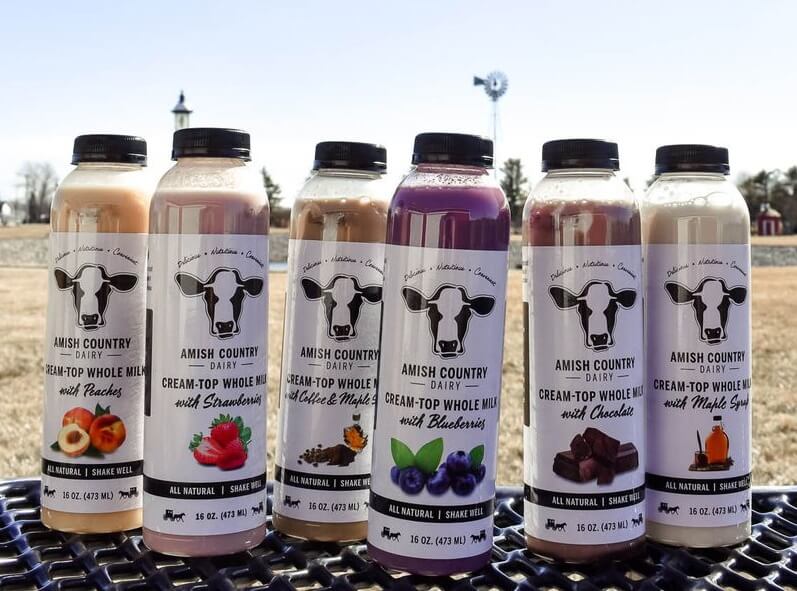
The flavors (including peach, chocolate, maple, and coffee) are apparently all-natural (using real fruit, etc), and they say they are transparent about what goes in it. The only further thing I’ll say on the product is, wow, maple syrup-flavored milk. Yum. Anything maple-flavored is an Achilles heel for yours truly.
What’s in a name?
But beyond that, one question came to mind on first seeing this: Is this an Amish dairy? As in, Old Order Amish-owned?
A form of “Amish” is in the name, but they never explicitly state that the owner is Amish. This is what leaves a little gray area to explore.
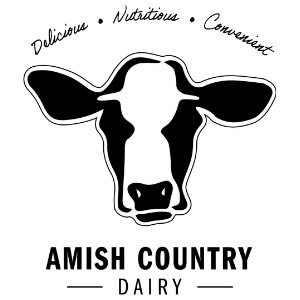
You can view the story and interview with the owner at the link above and judge for yourself (sorry, the video is not embeddable here). I intentionally did not dig super-deep into this question for the purposes of this post, deciding to basically go by just a single view of the info contained in the video/article.
Here are my observations:*
So, is this an Amish dairy? 5 things that made me think “no”:
- Photo/video of non-Amish workers
- Factory-like bottling environment (10,000 bottles/day)
- The business has a Facebook page, started in March (there’s also a website but I intentionally avoided exploring it as well:))
- The name uses the word “Amish”
- The location is northern Indiana and there are relatively few Amish dairies there
These are all things that might suggest the business is not Amish, especially when taken together and without further context. However, none of those are deal-breakers indicating a company is definitely not “Amish” – and there are a few more details to consider.
Update: it may not have been as clear as I should have made it what I am doing here:)
These are all certainly possible to see in an Amish-owned business. Some Amish businesses have non-Amish employees (for instance, off the top of my head I can think of examples in Amish companies in the wood products/furniture industries, the building industry, as well as market stands). A decent number of Amish businesses have Facebook pages or websites promoting their products (here’s an example of one Amish-owned food company with a website, or another from the construction industry, or this bulk food store with a Facebook page, managed by someone non-Amish). Some Amish businesses are sizeable manufacturers using sophisticated equipment and operations at a scale we don’t typically see among Amish, such as Kountry Wood Products in Nappanee, Indiana or Pioneer Equipment in Wayne County, Ohio.
The idea was that just looking at each aspect in the list by itself, would that make me think more that “yes” that’s quite common to an Amish business, or “no”, there are more Amish businesses where you wouldn’t see that, than ones where you would (and with the caveat that point #5 is more a region-specific observation a little different than the others).
For example if you showed me a Facebook page belonging to a milk business, and it was called Amish Country Dairy, and then showed me a photo of one of their workers, an English-looking woman in a baseball cap, with no other info, then I’d lean towards saying “no” – that if I had to say based just on those factors, especially considered together, then it’s less likely to be an Amish business. I’d lean towards guessing it was owned by English or maybe someone not Amish but with “Amish heritage”, and that perhaps they are using Amish-sourced milk and the word “Amish” for their marketing (which is a much more common practice to non-Amish-owned companies than to Amish-owned ones). That would be in the absence of any additional information.
And yes I am making a few assumptions about what we might typically think of as “Amish”, but the usual caveats apply about there being a lot of variation across the diverse Amish groups and so on.
So to conclude my windy additional explanation 🙂 I was having fun here with basically a thought experiment about what we traditionally see as characteristic of a typical Amish business – though any of these elements certainly don’t mean or prove a business is not Amish.
Okay, on to the clues which would point me more towards saying “yes”.
Is this an Amish dairy? 5 things that made me think “yes”:
- The owner’s name is Leon Miller
- He appears for an on-camera interview but you can only see his arms
- He speaks with what we might call an “Amish accent”
- He references his 15 years’ milking
- This Amish-sounding quote from Miller: “My hope with this business is to create a sustainable milk price for our community’s dairy farmers, that they may stay home and they have a prosperous and make a fair living,”
I could have checked a little deeper but intentionally abstained (that would ruin the fun of speculating here). I have a conclusion in mind, but you can be the judge for yourself.
*There is a more conclusive piece of information, two in fact, on the article/video that I did not see on my first look-through, but which I did on my second, and which seems to give the answer away. Even so, the above is still an interesting exercise when considering the idea of “Amish business” and the assumptions we might make about what that term means.


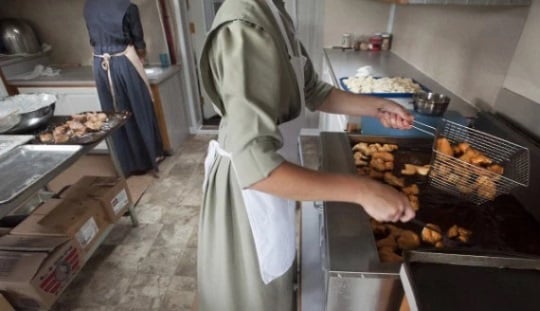
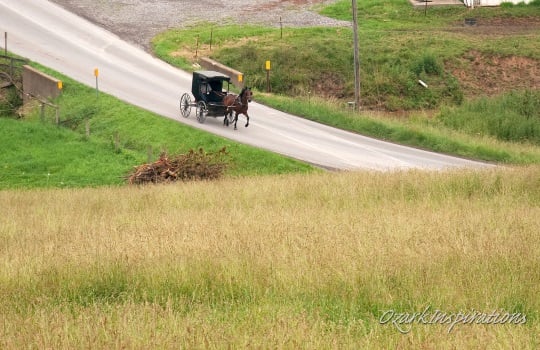

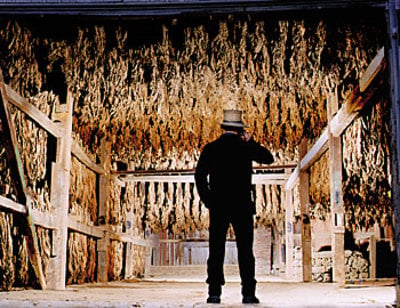
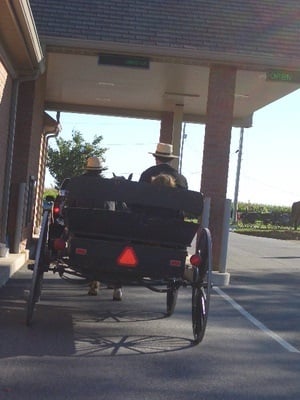
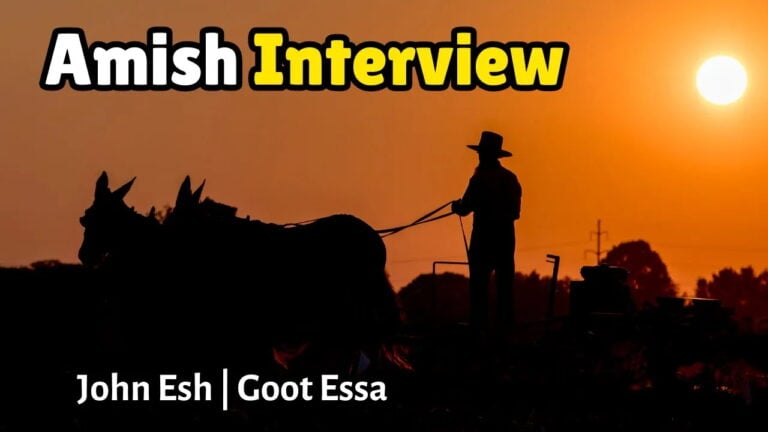
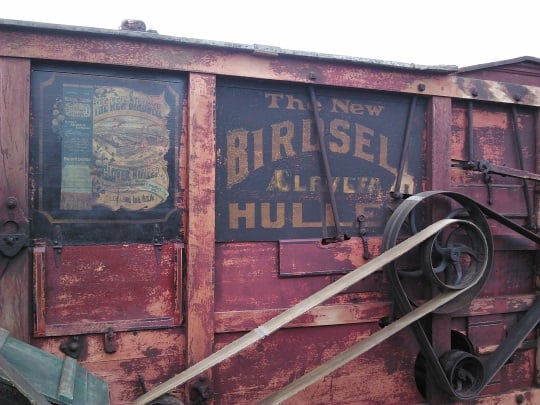

Don't want to over complicate things but..
First is the question of who owns what? That is, who is investing is what parts of the joint venture.
I’m assuming that this is a joint venture. Obviously, Old Order would not be using that type of bottling equipment.
What percentage of milk is Old Order, New Order, and not Amish?
What agreements/contracts have been made between the Amish and their English partners?
If it is not homogenized it must still be pasteurized in order to sell it commercially, leading to the question of who is doing what.
There are many other questions, but it would be good to hear in detail how this venture is actually organized, because small dairies have been going our of business left & right.
The "no" list doesn't jive with the facts, though
Hi, Erik!
I live among the Amish in NE Indiana, and as far as the “No” list:
1. Photo/video of non-Amish workers – that doesn’t prove much, really
2. Factory-like bottling environment (10,000 bottles/day)- some Amish businesses in this area are HUGE and very mechanized
3. The business has a Facebook page, started in March – lots of local Amish businesses have websites and facebook pages. They hire non-Amish people to do them. I’ve created a couple for local Amish businesses in the past, before they hired professional marketers to take them over.
4. The name uses the word “Amish” – hmmmm… not exactly proof that it’s not Amish
5. The location is northern Indiana and there are relatively few Amish dairies there – not true. There are Amish dairy farmers everywhere in this area.
I’m curious what you concluded!
Sue
Hi Susan, I concluded it was Amish.
Quick replies to your points below. In short I agree with much of what you wrote. Also see my last paragraph.
1. Sure, I agree it doesn’t prove much..though that’s not exactly what I was after
2. I know:)…some are
3. I know:) I’d still say the # of Amish businesses without a direct web presence significantly outnumbers those that do have one. I am talking about all Amish as a whole though. In more progressive communities like N. Indiana, it will of course be relatively more common
4. Amish-owned businesses with “Amish” in the name are *not* common. Though, there are some who use that language
5. “Relatively” is the key here (I meant N. Indiana compared to other Amish communities which maybe I should have emphasized). There are certainly a decent number farming in this #3 largest community (especially compared to say the Allen County Amish where it basically vanished). But RV work as you probably know is dominant and the # of Amish farmers declined as a % of the whole more than in comparable Amish communities such as Lancaster County.
(Tbh, I’d actually probably just cut this point from the list altogether as looking back at it now, I don’t think it is exactly relevant to the premise of the post)
Just keep in mind what I wrote at the bottom of the “no” list:
‘These are all things that *might* suggest the business is not Amish, especially when taken together and without further context. However, none of those are deal-breakers indicating a company is definitely not “Amish” – and there are a few more details to consider.’
In other words, I was playing something like devil’s advocate looking at aspects of the business that your average observer might not think of as classically or typically “Amish” at first look. There is a case on the other side against all the “no” points, though I would say #4 is the strongest point towards a “no”. You did well making similar cases as I would have if I also had argued the other side:)
This is an Amish owned business. It was formed by 4 amish men. You can read more on their website. I drive for the amish in southwest Michigan, and have actually been past this business. Not sure why they have hired non amish employees. This business is just northwest of Shipshwane In. I plan to stop in and visit this business next chance I get.
I actually know Leon and his family personally. I’ve been around since before this venture began. This is most definitely an Amish business. The Amish in Northern Indiana are very prone to business ventures. The “non Amish” that are working for them are most certainly still from Amish families.
This post was meant to be a fun look at common assumptions about what defines a business as “Amish”. Here in the year 2021 some of those assumptions are becoming less certain, and this business could be seen as an example of that. I expected to hear from those who know this business though, and I am glad for any additional details like these which you’ve shared. And, I really want to try that maple milk.
I considered that the girl with the non-Amish appearance might be from an Amish family, but just dressing English and technically not a church member. It’s not uncommon for young people in some communities to dress English. Especially in this progressive community.
The one thing above all that made me conclude this has to be Amish (even before noticing the giveaway details on my second look) was the no-face-on-camera part. No English people do interviews like that (unless, perhaps if they are in witness protection 😀 )
Define Amish
OK, there are Amish and there are Amish.
What ‘kind’ of Amish is this ‘district’?
Is the operation totally ‘Amish’ owned end-to-end, from teat to bottle?
This would be news to me if they are Old Order.
There is more variation than consistency when considering something like this. Amish milk is often not considered grade ‘A’, that is, not to be sold as ‘normal’ grocery store milk.
There’s a lot of detail missing before we can know what exactly we are talking about.
Erik – I respect your site and the attempts to educate and keeping up an interest, but in just about any article published you’ve got to define per article what ‘Amish’ you’re talking about, right? Otherwise you are perpetuating this false notion of what being Amish is.
Jim I appreciate the general point you are making. I often take care to make the point about differences across the Amish. In fact that’s one of the more frequent themes running through post on this site.
But no, I don’t think I’m perpetuating any false notion if that sort of explanation is not attached to every single post. In fact quite the opposite, on net I think this site does more to make that point than just about any online resource.
But as in any topic where the discussion continues and evolves over a long series of posts and comments, at times there are assumptions made about general understandings, in this case of the Amish, for the sake of readability. It’s a trade-off.
To provide the context which I think you’re talking about, there are numerous posts here dedicated just to the topic of differences across the Amish, for example:
https://amishamerica.com/amish-affiliations/
https://amishamerica.com/how-many-types-of-amish-are-there/
https://amishamerica.com/diversity/
https://amishamerica.com/amish-community/
and even https://amishamerica.com/amish_is_amish_/ (the very first post on this site from 2006:))
That said, in this particular post it might have been worthwhile to explore the concept of Amish differences a bit more deeply, or at least to have linked to one of those posts. As it happened this was a quick one written late in the day, so I decided to keep it lighter. But, I did make mention of your point in an update I’ve just added to the post.
Oh, let's complicate this!
I was recently given a small sign, “Please be patient while I overthink this.” (I mean all this is a light-hearted way, of course.) So in an attempt to further complicate things, one question I might offer is how we determine the definition of “Amish,” particularly in view of the diversity of these fine people.
I have an “Amish” hat hanging in my bedroom. Or at least I call it that. I’m not sure who or where it was made. As a writer, it now occurs to me that I should perhaps refer to it as “an Amish-style hat.” So perhaps this is an “Amish-style Dairy?” I’m not Amish so my “Amish-style hat” doesn’t earn that label because of ownership. If I were Amish, I could say my hat is “Amish-owned.” (I do often engage in “Amish thinking,” but that’s a different topic.)
And just to carry this one step further, the logo of the dairy actually says, “Amish Country Dairy.” That might be describing the location, not the ownership or type of dairy. Since I bought my hat in Lancaster County, I might accurately describe it as “Amish-style hat from Amish Country.” That could be somewhat true even if it was made in China.
One thing I am sure of: I wish this dairy was closer to me because their products sound awesome.
I also suspect the question proves that words ultimately only have the meaning we give them.
points well taken
Thanks for the links and response Erik. Points well taken.
I guess what got my interest in this was the following in the original post.
“But beyond that, one question came to mind on first seeing this: Is this an Amish dairy? As in, Old Order Amish-owned?”
It would be news to me that this operation could be Old Order. Which then leaves me still wondering how this group identifies themselves? What branch of Amish?
It’s an important question, which considers who is making what changes in order to ‘remain Amish’, in order to be socioeconomically integrated while still remaining separate and ‘plain’.
If the Amish running that business consider themselves Old Order I would be very surprised.
Yes, I get what you were trying to accomplish with the original post, and appreciate that effort, but you were asking us to think/analyze, which then leads to trouble 🙂
As Walter points out you have to define your terms, and the use of “Old Older” in relation to that post seems inappropriate. But you certainly got my attention if that was the goal, that is, to create engagement.
All that said, I’m a long time reader of your site and appreciate all the effort you put into it. I just got a little hung up on this particular post, partly because of the very serious problems small dairies have had competing against corporate farms. If this is a potential model for the use of Amish produced milk, then you have to ask what type of Amish could this apply to? Could this model be altered on some level to be applicable to other Amish branches? What alterations? Which Amish?
Maybe this thought process is far beyond the goals of the post.
It would be helpful if those that have more information, or could option such, on this particular operation could post it here.
Good questions
No problem, Jim. You raised some good questions worth addressing and I appreciate the comments.
Without going too deep into it, the broad term “Old Order” is generally taken to mean all those Amish who use horse-and-buggy transport (*I should add also they would define themselves as an Amish church, and generally be recognized by other Amish as such, and that this excludes horse-and-buggy Mennonite groups). This would include all those in this Elkhart-LaGrange community who fit that definition as well as other groups of Amish that have their own names, like Swartzentruber Amish, or Troyer Amish, and so on – and even, a bit confusingly, the “New Order” Amish are considered “Old Order” by this definition, despite the name (they’ve also been known by an alternative name of “Amish Brotherhood” but the “New Order” name is the one that has stuck).
So sometimes I think the term “Old Order” might give some the impression of a very low-tech group which would have little to do with the technology and marketing involved in such a business (maybe something like what people might think of when they see the Swartzentruber Amish).
But the definition is a lot broader than that and takes in Amish who do tap into different technologies, albeit often on a limited or controlled basis (eg, solar power, internet via 3rd-parties or limited smartphone use, computerized manufacturing machinery, etc.) Those are still “Old Order” Amish even though they’re doing things sometimes that maybe wouldn’t seem to fit with the idea of “low-tech” Amish people.
Beyond that, there are groupings known as affiliations, and this particular community would be the Elkhart-LaGrange affiliation, comprising that large community of the same name and some daughter settlements in other places. The article in my previous comment goes into more detail on that. https://amishamerica.com/amish-affiliations/
As for a business like this as a solution for Amish and other small producers, you raise a good topic and I think what Amish Country Dairy is doing here is a great business idea and the product is attractively packaged (and marketed from what I’ve seen). As far as how far it could be expanded, even the plainer producers like the Swartzentruber Amish could participate at least as suppliers to such an operation, even if they wouldn’t be positioned to be owners of the more advanced technology required to run such a business.
Erik
He does not say if the ingredients come from Amish farms or not. Same for the local dairy farms he mentions wanting to help.
I know Amish who own businesses with facebook pages. But to have their own website and a video showing the production line? Well, There’s a chance non-Amish are more involved with this business than some might think.
It’s called “Amish Country Dairy.” That does not mean it’s all Amish ingredients and workers. It implies the business is located in an area where there are Amish.
The woman with a baseball hat milking cows has a Tattoo on her neck. You can see it at about the 00:27 second mark of the video. Doubtful she is Amish.
Amish Dairy
I read this not-serious article when only Jim had written a response. His use of the word “obviously”, in my mind, disqualified him as meaningful source of information about the Old Order Amish of northern Indiana, expecially those in the Shipshewana area. His follow-up entry confirms my impression. Even the “light” treatment of the subject puts it in a spectrum with the sensational media/entertainment world, though at a different spot on the continum. Some of the entries since yesterday follow the same track, but several of the persons, I won’t name, with obvious experience with us here have given a clear rebuttal. First, a few points of clarity. “Old Order” simply means HORSE AND BUGGY TRANSPORTATION and may not directly define specific beliefs or practices or technology–or fit into anyone’s stereotype of what constitutes “Amish.” An interesting advertising/newspaper, called the PAPER, Milford, IN, read and distributed widely in northern Indiana has an article on this subject, called “Local Amish Farmers…” April 20, 2021. It says they produce about 4000 bottles per week (not the BIG number reported here), sold in 35 area retail locations The 2 farmers from the large east-of-Goshen settlement, and slightly smaller nearby Nappanee area settlement are backed by a group of 30 investors. The 4 share the actual work schedule, with 2 employes. “New Order” Amish? Of the 238 (2019) Old Order contiguous districts (congregations), there are NONE designated as “new order” (which would still be horse and buggy) that I’m aware of. In a number of ways, the larger Shipshewans area may be more “advanced” compared with some districts. If the Facebook, Website, Cell Phone question bothers anyone, do an Internet search for E & S Sales, Forks County Line Stores (where we often shop), Chupp’s Auctions, a general search for Amish business, for a free education. Also look for MennoHof to see how area groups work together. OH yes, between Shipshewana and Middlebury is a large poultry business, Middlebury Produce. I heard the (Mennonite, Amish background) executive say they used to market their product as “Amish Chickens.” But they didn’t feel right about this, for many of their contracted birds were not exclusively by Amish, so they now use “Amish Country Chickens” What’s the problem with “Amish Country Dairy LLC”? The Stutzman on whose farm the operation is located (just a short distance from my childhood home), also furnishes all the Grade A milk from his herd of Holsteins. Incidentally, Stutzman has a brother and a sister who married my Old Order Amish first cousins. Yes, I was born 85 years ago into a large Amish family, my father was an OO Preacher, and his father was our OO Bishop.
Dan, this response has a lot of interesting information, but I’m not exactly sure who certain parts of it are addressed to. The original post was about looking at the question of what makes an Amish business, but taking a different and hopefully more engaging approach than me just giving my conclusion that yes this appears to be an Amish business.
Not to put him on the spot, but I think Jim raises some interesting points worth addressing. He might not be of Amish background, but I sense that he wants to learn and engage on the topic, which is welcome.
You have demonstrated that you know something about the topic, and also that you have insider group status. I do believe your points could have been made just as well without the additional personal disparagement of commenters.
That aside, just one comment on an interesting point you raised – on using “Amish” vs. “Amish Country” to describe products.
I find the more gray-area term “Amish Country” is a clever and oft-used term for the reason you suggest in the chickens example. It gets the marketing benefit of the word “Amish”, but with the addition of “Country”, it more defines a geographical area than a people necessarily. And thus broadens the number of businesses that can arguably use such language ethically. After all, “Amish Country” is the general area where Amish live, and if for example a non-Amish-owned business is located right in Amish Country, then in some sense that’s perfectly descriptive. This creates space to get the benefit of the “A” word but also allows for justifying the description as truthful.
However, and I’m only speculating here, in the case of actually-Amish-owned Amish Country Dairy, they might be using “Amish Country” rather than “Amish” for similar reasons, but sort of with a reverse rationale – ie, rather than directly calling attention to the owner’s identity, “softening” the use of the “A” word by adding “Country” to it, and moving it more into that grayer area of description, if what I’m getting at here makes sense.
Or, that might have nothing to do with it at all. Maybe “Amish Country Dairy” simply has a nicer ring than the plainer “Amish Dairy”. I’d like to ask the man (I assume Leon Miller) who named the business, or maybe you have some insight on that.
Erik
He could be ex-amish to.
We do their marketing:)
At first I was concerned that this post would be offensive to me, but after reading it and the comments I must say I have truly enjoyed it.
Let me introduce myself: Hi I’m Liz Stump the Owner of Barnyard Marketing. We were hired to do the marketing for Amish Country Dairy
I will be happy to answer some of the questions that have been raised.
The woman you see in the video is an employee of the Stutzman farm. She along with her husband milk all of the cows. They are not part of the Stutzman family and they don’t work for Amish Country Dairy.
The Facebook page and website are operated by Barnyard Marketing as part of a full marketing plan.
“To answer the question if Amish Country Dairy is an Amish-owned company, the answer is yes. The business is owned and operated by Amish families and Amish dairy farmers. All of the milk being produced at this time comes from Amish owned dairy farms. As this business grows the hope is to include all dairy farms in our area that maintain certain standards and practices, and not just Amish owned farms.”
It is a real pleasure to work with this group of men and their product is outstanding. We will be producing a video soon to release on Facebook with the proper way to shake a cream top milk. The Amish people (if there are any) in this video will only show their arms or their backs out of respect to their beliefs.
As a side note: I really enjoyed the comment on Middlebury Produce’s Amish Chickens. My brother in-law and sister are the owners and I remember laughing about their Amish chickens.
“In our area I’m not aware of any church districts that even offer membership to poultry. :)”